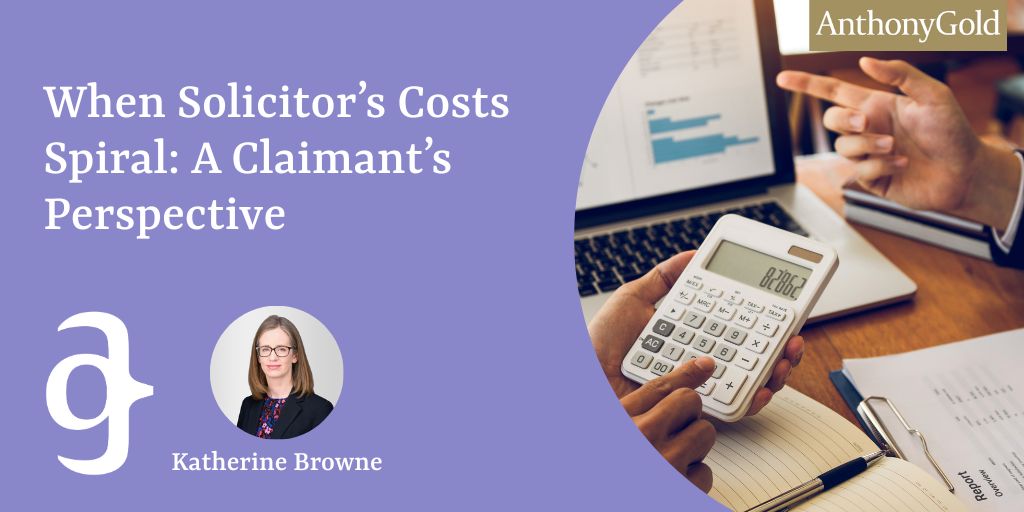When Solicitor’s Costs Spiral: A Claimant’s Perspective

Background
As a solicitor dealing with serious injury cases, I have observed that a favourite complaint of the insurance industry is that in catastrophic personal injury cases, claimant’s solicitors’ costs are too high. As a result, this sector has seen widespread government reform often the last 10 years which has been imposed to reduce costs incurred for representing an injured claimant.
The effect of this on access to justice for the most vulnerable is the subject of a blog for another day. Today I want to focus on how in my experience, claimant solicitors are acutely aware of the need for costs to be proportionate to the value of the claim. I would even go as far as to say that higher costs are in fact often driven by Defendant solicitor’s actions, or more accurately, lack of action, as I go on to discuss below.
Delays Caused by Defendants
In 2018, I was instructed to act for Miss M who was seriously injured when she was hit by a mobility scooter being driven by the defendant. The driver lost control of the scooter and Miss M was knocked to the floor and dragged some distance before being hit violently against a wall.
My client Miss M sustained a series of severe injuries, including extensive injuries to the right-hand side of her body. As a result of the accident, she also developed PTSD.
Although liability was admitted by the insurers, they refused to fund any rehabilitation to assist Miss M in her recovery.
Unfortunately, despite proactively seeking the limited treatment available under the NHS, Miss M’s symptoms worsened, and she developed a chronic pain condition which impacted her ability to continue with her everyday life. I instructed a pain expert in the case, who’s expert advice was that had Miss M had access to extensive rehabilitation at an early stage following her injuries, she would have been unlikely go on to develop this persistent pain condition.
Further delays caused by the Defendant
As soon as I had obtained all our supporting medical evidence, I made an offer to the defendant solicitors to settle this claim. They failed to respond. I issued and served court proceedings, and the case moved forward towards trial, meaning that a whole series of potentially preventable stages had to be completed, to include:
- finalising medical evidence,
- attending court hearings,
- drafting and serving witness statements, drafting expert agendas, and of course
- preparing for trial.
Throughout all these stages, and even though I was keeping the Defendant in the loop as regards my progress, with a view at all times to achieving a settlement of the matter, still the Defendant still failed to engage in any settlement discussions.
This was incredibly frustrating as liability had been admitted at an early stage in the matter, and so it followed therefore that Miss M was entitled to be compensated for her injuries. As Miss M’s solicitor, I was also acutely aware of the toll the ongoing litigation process was taking on her wellbeing. Over the course of 2 years, I had spoken with the Defendant’s solicitors on numerous occasions to try and get them to engage with me on settlement of the claim, yet they consistently refused to engage in any meaningful settlement negotiations. The result of this refusal to engage was in an inevitable increase in the time I had to spend to prepare the matter for trial, and therefore an increase in costs was unavoidable.
Late engagement from the Defendant
Three weeks before trial, I finally received an offer from the defendant solicitors and following a brief period of negotiation, I was able to secure a good settlement for Miss M.
My client was delighted with the settlement of her claim and to finally be able to put the lengthy litigation process behind her.
We are now in the process of agreeing costs with the Defendants – costs that are now significantly higher than they would have been had the Defendant’s solicitors worked collaboratively to settle this particular claim, and many more like it.
By contrast it is worth noting that I have often been able to secure excellent results for my clients both in term of securing interim payments for private rehabilitation treatments, and in negotiating final settlements when I have a collaborative party on the other side. Unfortunately where this is not the case, it is almost inevitable that claimant’s solicitor’s costs may be higher than initially anticipated, because our key objective is always to do the best for our clients.
We represent our clients to the highest possible standards, and our aim is to investigate their claims thoroughly and to conclude their claims expeditiously, even where the opposing party seemingly seeks to delay matters.
If you would like some advice on making a claim, please contact us on 020 7940 4000 or email us at mail@anthonygold.co.uk.
* Disclaimer: The information on the Anthony Gold website is for general information only and reflects the position at the date of publication. It does not constitute legal advice and should not be treated as such. It is provided without any representations or warranties, express or implied.*
No comments